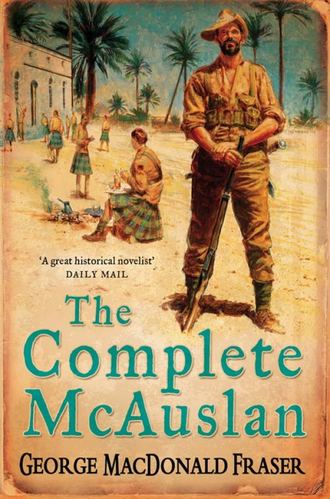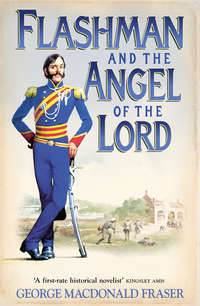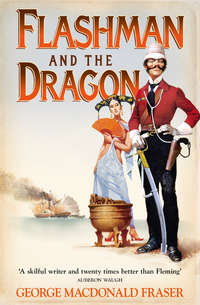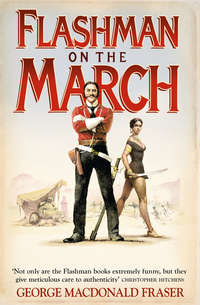
Полная версия
The Complete McAuslan
This merely proves that Satan finds mischief for idle hands, and there are few hands idler than those of military authority outside the firing line.
Edinburgh Castle, from the guards’ point of view, is in a class by itself. It is tremendously important, in a traditional rather than a strategic sense; if someone broke into it and pinched Mons Meg the actual well-being of the country would not be affected, but the blow to national prestige would be tremendous. The papers would be full of it. Consequently, providing a guard for the Castle involves—or used to—more frantic preparation, ceremonial, organisation, and general nervous tension than the filming of “Ben Hur”. It is rather like a combination of putting on a Paris fashion display and planning a commando raid, and the fact that its object is to provide a skeleton guard which couldn’t stop a marauding party of intelligent Brownies is, in the military view, beside the point.
It was a few months after our battalion had come home from the Middle East to be stationed near Edinburgh. It was one of those summers just after the war when there was gaiety and eagerness in the air, and the dark years were just behind and everyone was enjoying themselves. Princes Street was all sunshine and uniforms and pretty dresses, the American Fleet was in the Forth, royalty was coming to town, God was in his heaven, and I was once again the battalion orderly officer. It was a restful job, wandering round barracks drinking cups of tea in the cookhouse, chivvying the Jocks out of the canteen at closing time, casting a critical eye at the guards and picquets, and generally taking life easy—until some genius in the High Command woke up one morning with the brilliant idea that during the royal visit, with distinguished American naval dignitaries also being on hand, it would be nice to have a Highland regiment on guard at the Castle. That meant us, and us meant me.
The turmoil that broke out from our orderly room was indescribable. The Colonel, that kindly, vulture-faced man who had looked Japanese guards in the face on the Moulmein Railway and said, “No”, now became visibly agitated for the first time in living memory; he took me aside, addressed me as “Young Dand”, twisted his moustache, and spoke rapidly and incoherently about the importance of putting on a good show. The Adjutant got on the other side of me and rattled instructions into my ear, impressing the necessity of perfect organisation, split-second timing, immaculate appearance, and perfect coordination. He gave me to understand that the slightest slip would mean the ruin of the regimental reputation and my own personal destruction, and exhorted me to keep calm.
Like every young officer in dire need, I went straight to the Regimental Sergeant-Major, who drew up his enormous bulk an inch higher at the thought of exhibiting his perfections before royalty, soothed my hysterics, and suggested that we go through the drill. As he reminded me, it was perfectly simple; we had done it together scores of times without a hitch. All we needed was an intelligent guard consisting of sergeant, corporal, and five good men, and we could take our pick of my company.
We went through the drill. What happens at guard-mounting is this: the orderly officer and R.S.M. wait at one end of the parade ground, just in front of the object to be guarded—in our case the Castle gateway. The guard march on at the other end of the parade ground, and the R.S.M. brings them to a halt roughly in its middle. He then invites the orderly officer to inspect them, and the pair of them march the fifty or so yards to the guard, look them over, and march back again. The R.S.M. roars out more orders, the guard present their rifles for inspection, officer and R.S.M. march forward again, look-at the rifles, march back, and the R.S.M. marches the guard into the Castle, the orderly officer standing off to one side and taking the salute. There is a pause of a couple of minutes, in which the officer has the parade ground to himself, then the old guard is marched out, briefly inspected, and marched off. The officer retires, and that is that. Easy; in our case the only difference was that a vast crowd, including royalty and a fearsome array of home and foreign brass, would be watching.
We summoned the Company Sergeant-Major, a hardbitten Aberdonian, and he produced the list of men who were due for guard.
“You’ve got McAuslan down here,” I said.
“He’s due,” said the C.S.M.
“He’s overdue,” I said. “I’d sooner go on guard with Laurel and Hardy.”
McAuslan, as I have explained, was one of those soldiers. He was short, pimply, revoltingly dirty, incredibly unseemly, and dense to a degree. Not that he didn’t try; he was pathetically eager to please, but it was no good. His stupidity and uncleanliness were a sort of gift, and combined with his handlessness made him a military disaster. He had been twice forcibly washed by his comrades, and had never been off defaulters until it was discovered that punishment was wasted on him. The thought of having him on the Castle guard, out there in the sunlight, with royalty watching …
“No,” I said. “Lose him. Forget him. Get anyone you like, get one of the cooks, but not McAuslan.”
The C.S.M. said he would see to it, and for two days my platoon barrack-room went at it as never before. The sergeant, corporal and five men were scrubbed, polished, drilled, examined, pleaded with, threatened, cajoled, and watched over like newborn chicks. I took them through the drill until they could have done it in their sleep; the best belts, tartans, cap badges, pouches, and small packs were borrowed from the ends of the battalion and worked on by the whole platoon; their boots were boned and polished till they gleamed like black diamonds; their rifles and bayonets were oiled and polished till they glittered; even their puttees were ironed, and when they stood up on the morning of the great day in the barrack-room, in all their glory, they were a lovely sight to see.
The R.S.M. and the C.S.M. and I buzzed round them, peering and pulling and encouraging them; the Colonel looked in, hummed, approved, got in the way, and was tactfully rebuked by the R.S.M.; he fidgeted for a while, clicking his lighter and chewing his cigarette, and then said, “All right, young Dand; good luck, lads, must be off,” and shot out—poor soul, he was going to be next to royalty, suffering agonies.
Then we waited. A truck was to take us to the Castle in about half an hour; I still had to get dressed, but my kit was all in order, with my batman standing guard on it, and for the moment we had the barracks almost to ourselves. The rest of the battalion were out on an exercise which was going on at Redford, and we sat in silence, smoking and watching the sweat on the backs of our hands.
There was a clatter of boots in the corridor, the door opened, and I looked up to see McAuslan in the doorway. Amazingly he was dressed as for guard-mounting—that is, all his equipment was there, but in its usual state of rank disorder. You wouldn’t have let him guard a coal-bunker.
“In Goad’s name!” said the C.S.M. “Whit are you on?”
“Guard, sir,” said McAuslan. His bonnet was squint, and there was an oil-stain on his shirt. He had perhaps washed his face three days ago.
“Guard?” echoed the R.S.M. “Not you, my lad. You were taken off the rota days ago. Don’t you look at the notice-board?”
“Ah cannae read,” said McAuslan.
“Aye, weel, ye can hear,” said the C.S.M. “And ye’re not on guard, nor likely tae be. Ye know why? Ye’re dirty, ye’re idle, an’—an’ ye’re a positive disgrace. Now, oot o’ this and report to the quartermaster for fatigues.”
McAuslan, pimply and unkempt, wiped his nose and looked unhappy. For a minute I couldn’t think why; not one man in that guard but would have gladly slipped out of it if he could; they were sitting quaking, and here was this tartan Caliban looking miserable at news that would have delighted any of them.
“All right, McAuslan,” I said. “Carry on to the quartermaster.” And for some reason I found myself adding: “Sorry.”
He went, and the truck rumbled up outside. I was just stubbing out my cigarette and preparing to go to my quarters to dress when it happened. I still see it in nightmares.
One of the guards, a stocky, dapper Glaswegian named Grant, had stretched himself and strolled to the door. What he put his foot on I don’t know, but one moment he was standing, and then he was falling, and some evil spirit had caused a drum of yellow paint, used for marking kit-bags, to be in a corner by the door, and one moment there was a beautiful soldier and the next there was a swearing creature whose kilt and left arm and left leg were a different colour. His comrades leaped back squealing like debs at Ascot.
We gazed at him appalled. Plainly he was beyond repair, there was no one else to take his place, we could not go on a man short—or so it seemed to me then, with military procedure drilled into my mind. I still had to dress, fool that I was to have left it so late, we had about five minutes—and royalty and the rest of them would be waiting. This was desperate. Where to find another man?
The R.S.M. was looking at me. I looked from him to the C.S.M. We all had the same thought.
“My God!” I said.
“We cannae take him,” said the C.S.M.
“We must,” said the R.S.M., and lifted up his voice. “McAuslan!”
Two minutes later I was in my quarters, wrenching on my dress uniform, tearing at the kilt buckles, my batman blaspheming as he adjusted my sporran and buckled on my Sam Browne. Then I was running, the truck was at the door, I had a horrid vision of a pallid ragamuffin sitting opposite the R.S.M. in the back, being told the intricacies of guard drill—guard drill, to McAuslan, the man who thought slope arms was something to do with the Nazi salute.
I don’t remember the drive through Edinburgh, mercifully; and to this day even my memories of Edinburgh Castle itself are hazy. I remember being there in the sunlight, before the gateway, and the murmur of a brightly coloured holiday crowd, and the little group of green-tartaned figures coming on at the other end, with McAuslan shachling in the middle of the rear rank, managing to swing his left arm in time with his left leg. (Try that, sometime; only McAuslan can do it.)
Then they halted, rigid in the heat haze, and the thunder of the R.S.M.’s voice broke the silence, and behind me I heard the mutter of the C.S.M.—“Goad, look at ’im. No two pun’ of him hingin’ straight.” I knew who he meant.
Then the R.S.M., huge and magnificent, was saluting in front of me, and my own voice was barking (surprisingly strong) and I came awake again, and paced across the vast distance to the guard.
They were doing well. They were all red in the face, and when you got near you could see them trembling, but they were standing up straight; they were with it. As I moved slowly along the front row I heard my own voice again, softly this time.
“Easy does it, now, easy. You’re doing fine. Nothing to worry about. You’re looking good, McFarlane, you’re looking very good. Head up a wee bit, Nichol, that’s it. You’re a good-looking guard.” And behind me the R.S.M. whispering: “Next order is port arms. Take it steady.”
Now the second rank, and I was opposite McAuslan. The R.S.M. and C.S.M. had done their best, but I was thankful the spectators were a hundred yards away. His face was grimy, his boots were dull, his shirt and kilt appeared to have been slept in. When I got behind him I noticed his bayonet: there was a ring of rust between blade and sheath.
“Easy, MacAuslan,” I said, and, God forgive me; “You’re looking fine.”
We marched back, the R.S.M. and I, gave them port arms, and marched forward again. I made a pretence of looking at the rifles, which were held up for inspection, but no more than a glance, until we came to the second row. As I passed McAuslan—his rifle looked as though it had been at the bottom of the Monkland Canal for a month—I heard the R.S.M. make a noise. If you think there is no such thing as a yelp and whisper combined, there is.
I looked, and nearly passed out. At port arms the rifle bolt is drawn back, exposing the magazine, and McAuslan’s magazine had gleaming brass rounds in it. How he had managed this I still don’t know, but there he was, with a loaded rifle, mounting guard at Edinburgh Castle. For a vivid moment the thought that he was going to assassinate royalty crossed my mind; then I realised, with mounting horror, that the guard’s next manoeuvre was to “ease springs”, which involves working the bolt and finally pressing the trigger, which in McAuslan’s case would mean scattering .303 cartridges all over the place and probably blowing someone’s head off.
But nothing is too much for an R.S.M. Deftly he reached over, detached McAuslan’s magazine, and conjured it out of sight. Then we were marching back to our places, and I was just breathing again when I was aware of a curious sensation at my right hip.
You know how it is—not a pain, or even a touch, but just a feeling, as though something has been taken away. I felt, rather than heard, a slight snap, and instinctively clapped my right fist to my hip. There was a movement that was not the motion of marching; and for a few seconds I knew real, paralysing terror. One of my kilt buckles, wrenched in the hurry of dressing, had given way. There was a second one, of course, but was it fastened properly? I knew, with horrifying certainty, that if I removed my fist that vast, silent crowd would be treated to the edifying sight of a Highland officer marching in his shirt-tail, while his kilt collapsed in ruins about his ankles. In that moment I really wanted to die.
I halted, turned, and shouted my orders, and then paced off to the side to take the salute. I was marching with right arm akimbo, and the military in the crowd must be wondering and whispering. I halted and turned, bringing my fist into my kidneys and clutching with my thumb; the guard came marching past, throwing on the style in their relief (McAuslan was swinging left arm and left leg together in fine abandon); their heads snapped round in salute—which I didn’t return—and they had vanished into the gateway.
I was alone, with the worst to come. I had to turn again, march to the edge of the crowd in front of the General Officer—with royalty beside him—salute, and march off again. But I couldn’t salute! My saluting hand was holding up my nether garments, and if I removed it I should go down in history as the Man Whose Kilt Fell off in Front of Royalty At Edinburgh Castle.
It wouldn’t do. Similarly, I could not march off without acknowledging royalty and saluting. What do you do in this case? I shall tell you. You turn smartly about, arm akimbo—it gives a Rupert of Hentzau touch, anyway—march up to the saluting base, salute left-handed, turn about, and March off through the Castle gateway, dead casual, like Caesar at Pharsalia.
In the guard room was pandemonium. McAuslan, unseen by me, had dropped his rifle in the gateway, the R.S.M. had caught it, McAuslan had turned round and asked for it back, the R.S.M. had almost thrown him into the guard room, and the corporal, a sensitive soul, had done a brief faint.
Конец ознакомительного фрагмента.
Текст предоставлен ООО «ЛитРес».
Прочитайте эту книгу целиком, купив полную легальную версию на ЛитРес.
Безопасно оплатить книгу можно банковской картой Visa, MasterCard, Maestro, со счета мобильного телефона, с платежного терминала, в салоне МТС или Связной, через PayPal, WebMoney, Яндекс.Деньги, QIWI Кошелек, бонусными картами или другим удобным Вам способом.








